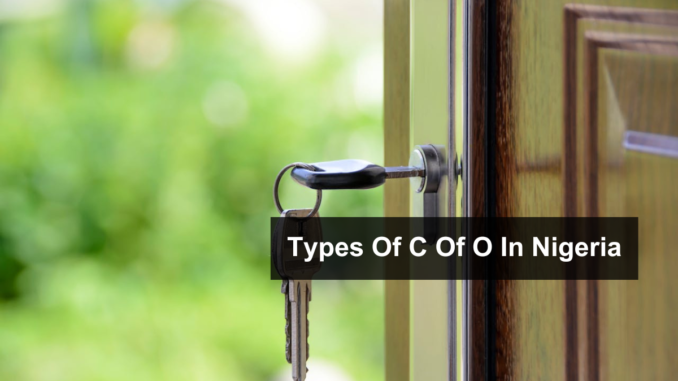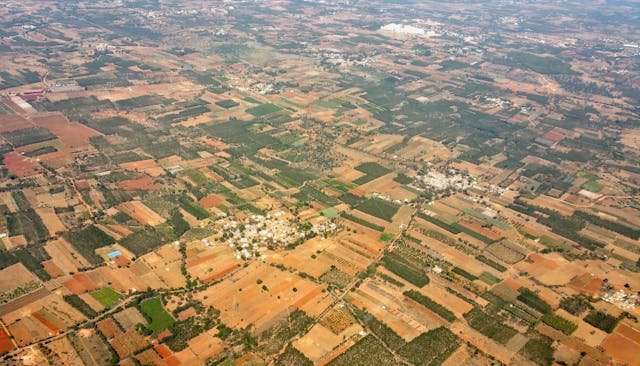
The Certificate of Occupancy (C of O) stands as a cornerstone of land ownership in Nigeria. This document serves as irrefutable proof that a specific piece of land is legally yours. While the concept of a C.O. might seem straightforward, there’s more to it than meets the eye. Nigeria recognizes several categories of C of Os, each tailored to the purpose and ownership structure of the land.
In Nigeria, there are seven types of Certificate of Occupancy (C of O), they are:
Contents
1. Residential Certificate of Occupancy
This is the most widely used C of O. Issued by the government under the Land Use Act of 1978, it essentially says, “The government owns all land, but you (the individual or company) have the legal right to occupy this specific piece for a set period.” This period is typically a long lease, often 99 years.
Think of it like renting from the government but for a very long time. There might be specific conditions attached to this C.O., so be sure to read the fine print. A key advantage of a Residential Certificate of Occupancy is the ability to have it issued in your name, simplifying the process of securing Mortgage loans for construction or property improvements.
See>>> How Much Does C of O Cost in Nigeria?
2. Agricultural Certificate of Occupancy
This C of O caters specifically to those seeking land for agricultural endeavours. For instance, land zoned for agricultural use, like vast swathes of Epe and Ikorodu, will likely come with an Agricultural C.O. While some landowners in these areas might possess freehold rights, signifying permanent ownership, the designated use for agriculture is reflected in the C of O itself. The land tenure for an Agricultural Certificate of Occupancy is shorter, ranging from 25 to 28 years, although procedures might exist to convert it for residential use in the future.
3. Industrial C of O
This is relevant for companies establishing industrial facilities. You will get this type of C.O. if you buy land in the area government allocated for building industries. Industrial giants like Dangote would most likely hold Industrial C of Os for their vast manufacturing plants. These are strategically issued for locations in less populated areas to mitigate potential pollution concerns. The tenure for an Industrial Certificate of Occupancy is typically 35 years.
4. Family Certificate of Occupancy
In some parts of Nigeria, families with a long-standing and well-respected reputation within their communities may be granted a unique type of C of O – the Family C of O. This doesn’t have a specific expiry date and signifies the family’s established claim to the land, passed down through generations.
5. Government Allocation
A Government Allocation C of O is a type of Certificate of Occupancy issued in Nigeria where the land was originally allocated by the government itself. Here’s a breakdown of its key aspects:
Issued by the Government: As the name suggests, this C.O. originates from the government, not from a private seller.
Allocation Recipients: The government can allocate land to various entities, including:
- Companies seeking to expand their operations.
- Government ministries requiring land for public projects (schools, hospitals, etc.).
- Reputable individuals for development purposes.
- Foreign investors looking to establish a business presence in Nigeria.
Leads to a Standard C of O: The government allocation itself isn’t the final C.O. Following the allocation, the recipient will typically go through the process of obtaining a standard one, which could be Residential, Industrial, Commercial (if it exists in your area), or another category depending on the intended use of the land.
Not a Separate C of O Category: It’s important to note that “Government Allocation” isn’t a distinct type of C of O itself. Think of it as the origin story of how the land was acquired. The eventual Certificate of Occupancy will reflect the designated purpose (residential, industrial, etc.) for which the land will be used.
6. Excision
Excision refers to a C.O. issued specifically to a village for a designated area of land. Land with an Excision Certificate of Occupancy cannot have any other types of C.Os issued on it. This ensures clear and undisputed ownership by the village community.
Understanding the different types of C of Os is necessary before acquiring land in Nigeria. It empowers you to ensure you receive the right C of O for your intended purpose, along with a clear understanding of the ownership rights and limitations associated with the land. This knowledge can safeguard your investment and prevent future complications.
7. Global C of O
A Global Certificate of Occupancy is a document that proves ownership of a large piece of land. It is usually gotten by a real estate firm. It’s different from the aforementioned C.Os. in a few ways:
- Issued for large areas: A Global C of O covers an entire estate or development, rather than a single plot.
- Issued to one entity: This document is typically issued by the state government to the developer or owner of the whole estate, not individual plot owners.
- Individual plots get Deed of Assignment: When you buy a plot within a Global C of O area, you won’t get your own C.O. Instead, you’ll receive a Deed of Assignment from the developer. This deed proves your ownership of the specific plot within the larger estate.
Here’s an analogy: Imagine a Global Certificate of Occupancy as a big apartment building’s ownership document. The entire building has one certificate. Each individual apartment owner has a lease agreement proving the ownership of their specific unit within the building.
Having this C.O. proves ownership of the whole property. In this case, a Deed of Assignment is sufficient when transferring ownership.
See>>>
- Land Documents and Titles In Nigeria You Need To Know
- Why Land Banking Could Be Your Next Investment Powerhouse
- 16 Things to Know Before Buying Land in Nigeria
- Own It Now: Top Mortgage Banks in Nigeria
Remember: A C of O is a vital document for secure land ownership. By understanding the different types and seeking professional guidance, you can ensure your piece of Nigeria is truly yours to hold onto. You can contact us to speak with one of our agents to learn more.
- Follow me on TikTok for quick tips and behind-the-scenes tours
- Subscribe to my YouTube channel for in-depth videos and property showcases
- Follow me on Facebook for updates, listings, and real estate advice



Leave a Reply